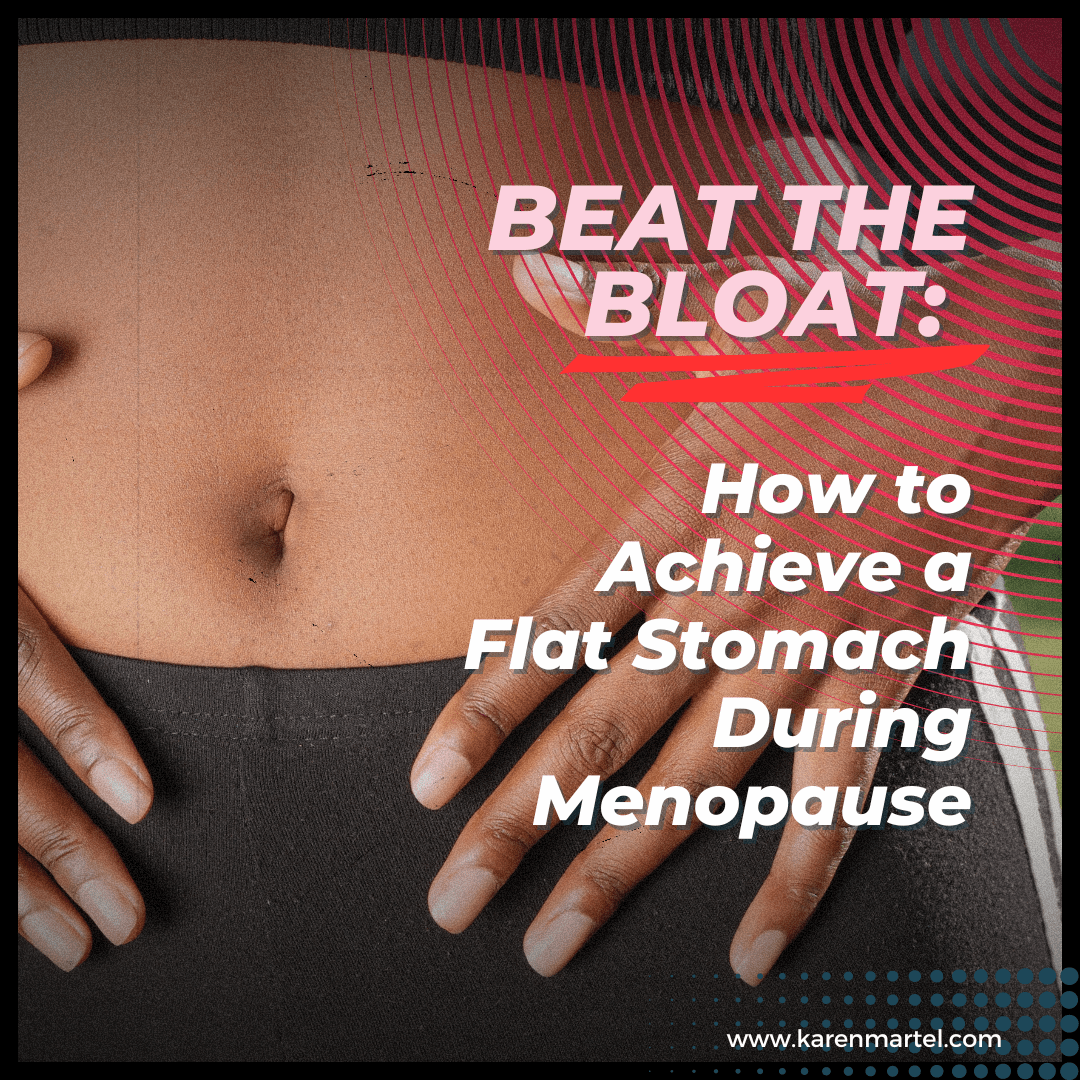
Beat the Bloat: How to Achieve a Flat Stomach During Menopause
Bloating during menopause can feel like the unwelcome guest that just won't leave. If you've ever felt like your belly has suddenly transformed into a balloon, you're not alone. Many women experience this frustrating symptom as they navigate the hormonal rollercoaster of menopause. But here's the good news: understanding the root causes of menopausal bloating can help you find relief and reclaim your comfort. Let's dive into why this happens and what you can do to deflate the bloat and feel more like yourself again.
Estrogen’s Role in Our Digestion
Bloating often kicks in during perimenopause, those years leading up to menopause when hormonal shifts start to shake things up. As progesterone levels drop, our bodies can enter an estrogen-dominant state. This imbalance between progesterone and estrogen is a common culprit behind that uncomfortable bloating sensation. Estrogen dominance can lead to water retention and digestive issues, making your belly feel like it’s in constant turmoil. Understanding this hormonal interplay is key to tackling bloating head-on and finding ways to ease the discomfort.
Too much estrogen can impact our digestion, but so can too little. As estrogen levels begin to drop, it can throw our digestive systems for a loop. Estrogen plays a crucial role in regulating our gut motility and the balance of good bacteria in our intestines. When estrogen dips, it can slow down the movement of food through the digestive tract, leading to constipation and a buildup of gas. Additionally, this hormonal shift can disrupt the balance of gut flora, contributing to increased bloating and digestive discomfort.
Studies have shown that estrogen is key to maintaining the mucosal barrier function of the gastrointestinal tract. It supports the epithelial and physiological barriers that protect our gut lining. Estrogen also regulates basal acid secretion and duodenal bicarbonate secretion, which helps prevent peptic ulcers. So, when estrogen drops, these protective functions can falter, further affecting our digestion. The drop in estrogen doesn’t just affect our mood and skin—it has a direct impact on how smoothly our digestive system operates, making it an important factor to consider when addressing bloating during menopause.
Thyroid and Digestion in Menopause
As if the hormonal changes weren't enough, thyroid function often takes a hit during perimenopause and menopause too. A sluggish thyroid, or hypothyroidism, is common in this stage of life and can slow down the motility of the bowels. The thyroid gland produces hormones that play a critical role in regulating our metabolism, including how efficiently our digestive system works. When thyroid function decreases, everything slows down, including bowel movements. This slowdown can lead to constipation and a buildup of gas, further contributing to that uncomfortable bloating sensation. Understanding the connection between thyroid health and digestion can help in finding effective ways to manage these digestive challenges during menopause.
The Role of Stress
Stress levels can skyrocket during perimenopause and post-menopause, adding another layer of complexity to our digestive woes. The hormonal upheaval of menopause can be a significant stressor, and life changes during this time can add to the pressure. When stress hits, our bodies release cortisol, the primary stress hormone. Elevated cortisol levels can wreak havoc on digestion by diverting blood flow away from the digestive tract, slowing down gut motility, and altering the balance of gut bacteria. This can lead to a host of digestive issues, including bloating, gas, and constipation. In essence, when our stress hormones are in overdrive, our digestion takes a back seat, making it crucial to manage stress effectively to keep our digestive system running smoothly during this transition.
Solutions
1. Change Your Diet
Finding relief from bloating during menopause often starts with making mindful dietary changes. I recommend a relaxed paleo-based diet for women in midlife. This approach focuses on whole, nutrient-dense foods like animal proteins, vegetables, fruits, nuts, and seeds while avoiding grains, legumes, and processed foods. Many women find that these foods can cause bloating and digestive discomfort due to their potential to irritate the gut and promote inflammation. By cutting out these common culprits and embracing a paleo-based diet 80% or more of the time, you can support your digestive health, reduce bloating, and feel more energized and balanced. Remember, it's about finding what works best for your body, so be flexible and listen to your gut—literally!
2. Support Your Gut Microbiome
Supporting your gut microbiome is key to tackling bloating and maintaining overall digestive health during menopause. A healthy gut microbiome thrives on diversity, so aim to include a wide variety of vegetables and fruits in your diet. These colorful, fiber-rich foods provide the essential nutrients and prebiotics that nourish your good gut bacteria.
In addition to a diverse diet, consider incorporating quality supplements to further support your digestive health. A good digestive enzyme can help break down food more efficiently, reducing the chances of bloating and discomfort. Soil-based probiotics are another excellent choice, as they introduce beneficial bacteria that can enhance gut flora balance and improve digestion. Together, these dietary and supplemental strategies can create a robust gut environment, helping to alleviate bloating and promote better overall health during menopause.
3. Replacing Lost or Suboptimal Hormones
Staying on top of our depleting hormones during menopause is crucial for managing bloating and a myriad of other symptoms. Hormone Replacement Therapy (HRT) offers a way to replace and optimize our hormone levels, helping to restore balance and alleviate discomfort.
When estrogen and thyroid levels decline, it can disrupt various bodily functions, including digestion and gut health. By replenishing these hormones through HRT, we can support our digestive system and reduce the likelihood of bloating and related digestive issues.
Optimizing hormones also benefits overall well-being, including mood, energy levels, and cognitive function. It's about reclaiming vitality and feeling our best during this transformative stage of life. Working with a healthcare provider to find the right HRT approach for your needs can make a significant difference in managing menopausal symptoms and improving your quality of life.
4. Get Moving
Incorporating exercise, such as yoga, can be incredibly beneficial for digestion during menopause. Yoga, in particular, offers gentle movements, deep breathing techniques, and poses that can stimulate digestion, reduce stress, and promote overall well-being.
Certain yoga poses, like twists and gentle forward bends, can massage the abdominal organs and improve digestion by enhancing blood flow to the digestive tract. Additionally, the relaxation and stress-reducing benefits of yoga can help lower cortisol levels, which in turn supports healthy digestion and reduces bloating.
Regular yoga practice not only benefits physical health but also nurtures mental and emotional balance, making it a holistic approach to managing digestive issues during menopause. Incorporating yoga into your routine can be a calming and effective way to support digestive health and promote overall wellness during this transformative time.
5. Manage Stress
Managing stress in midlife is crucial for overall well-being, including digestive health. Incorporate mindfulness practices or meditation into your routine to reduce stress.
Menopause and Bloating: The Bottom Line
While bloating and digestive discomfort might be part of your menopause journey now, they don't have to be permanent. By following these tips and staying proactive, you can beat the bloat and enjoy a flatter, more comfortable stomach.
Navigating bloating and digestive challenges during menopause requires a multifaceted approach that addresses hormonal changes, dietary choices, exercise routines, stress management, and overall well-being. By understanding the impact of hormonal shifts on digestion, making mindful dietary choices, incorporating regular exercise like yoga, managing stress effectively, and seeking support when needed, you can take proactive steps to alleviate bloating and promote digestive health during this transformative stage of life. Remember, it's about finding what works best for your body and embracing a holistic approach to wellness that supports you from the inside out. If you are looking to get help with your digestion and other midlife symptoms, book a discovery call to find out how we can help.

Find Karen Martel on Apply Podcast
Karen Martel is a Certified Hormone Specialist and Transformational Nutrition Coach dedicated to empowering women through their health journeys.
As the host of the popular podcast The Hormone Solution, Karen tackles the complexities of hormonal health, weight loss resistance, and the challenges that come with perimenopause and menopause.
Her mission is to disrupt outdated narratives surrounding women's health, providing reliable information and practical solutions that help women reclaim their vitality. With personal experience overcoming her own health struggles, Karen offers insights into hormone optimization and sustainable weight management strategies.
Join her as she engages in enlightening conversations with experts and shares actionable advice, all aimed at helping women navigate their unique hormonal landscapes with confidence and clarity. Tune in to discover how to embrace life's stages while enhancing overall well-being.






